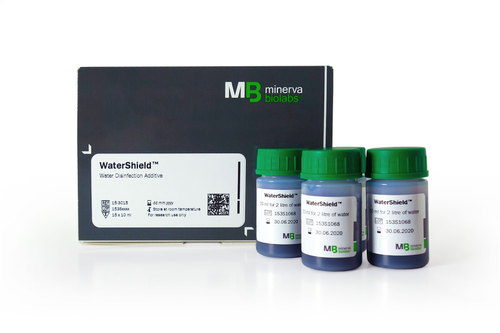 細(xì)胞培養(yǎng)進(jìn)口血清進(jìn)口胎牛血清進(jìn)口新生牛血清進(jìn)口豬血清馬血清
細(xì)胞培養(yǎng)進(jìn)口血清進(jìn)口胎牛血清進(jìn)口新生牛血清進(jìn)口豬血清馬血清 支原體檢測盒及標(biāo)準(zhǔn)品常規(guī)PCR檢測試劑盒熒光定量PCR檢測(qPCR法)支原體DNA提取靈敏度標(biāo)準(zhǔn)品(方法驗(yàn)證用)特異性標(biāo)準(zhǔn)品(方法驗(yàn)證用)PCR定量標(biāo)準(zhǔn)品(可用于方法驗(yàn)證)
支原體檢測盒及標(biāo)準(zhǔn)品常規(guī)PCR檢測試劑盒熒光定量PCR檢測(qPCR法)支原體DNA提取靈敏度標(biāo)準(zhǔn)品(方法驗(yàn)證用)特異性標(biāo)準(zhǔn)品(方法驗(yàn)證用)PCR定量標(biāo)準(zhǔn)品(可用于方法驗(yàn)證) 支原體祛除試劑細(xì)胞中支原體祛除環(huán)境支原體祛除水槽支原體祛除
支原體祛除試劑細(xì)胞中支原體祛除環(huán)境支原體祛除水槽支原體祛除 干細(xì)胞培養(yǎng)基
干細(xì)胞培養(yǎng)基 DNA/RNA污染祛除DNA/RNA污染祛除試劑DNA污染監(jiān)測
DNA/RNA污染祛除DNA/RNA污染祛除試劑DNA污染監(jiān)測 RNA病毒研究試劑RNA病毒檢測試劑盒病毒RNA提取
RNA病毒研究試劑RNA病毒檢測試劑盒病毒RNA提取 PCR儀器及配套產(chǎn)品DNA污染監(jiān)測祛除PCR/qPCR儀性能檢查PCR試劑PCR試劑盒PCR預(yù)混液(凍干粉)熱啟動(dòng)聚合酶MB Taq DNA
PCR儀器及配套產(chǎn)品DNA污染監(jiān)測祛除PCR/qPCR儀性能檢查PCR試劑PCR試劑盒PCR預(yù)混液(凍干粉)熱啟動(dòng)聚合酶MB Taq DNA 微生物PCR檢測食品檢測類產(chǎn)品食品微生物檢測細(xì)菌PCR檢測
微生物PCR檢測食品檢測類產(chǎn)品食品微生物檢測細(xì)菌PCR檢測
- 細(xì)胞培養(yǎng)進(jìn)口血清進(jìn)口胎牛血清進(jìn)口新生牛血清進(jìn)口豬血清馬血清
- 支原體檢測盒及標(biāo)準(zhǔn)品常規(guī)PCR檢測試劑盒熒光定量PCR檢測(qPCR法)支原體DNA提取靈敏度標(biāo)準(zhǔn)品(方法驗(yàn)證用)特異性標(biāo)準(zhǔn)品(方法驗(yàn)證用)PCR定量標(biāo)準(zhǔn)品(可用于方法驗(yàn)證)
- 支原體祛除試劑細(xì)胞中支原體祛除環(huán)境支原體祛除水槽支原體祛除
- 干細(xì)胞培養(yǎng)基
- DNA/RNA污染祛除DNA/RNA污染祛除試劑DNA污染監(jiān)測
- RNA病毒研究試劑RNA病毒檢測試劑盒病毒RNA提取
- PCR儀器及配套產(chǎn)品DNA污染監(jiān)測祛除PCR/qPCR儀性能檢查PCR試劑PCR試劑盒PCR預(yù)混液(凍干粉)熱啟動(dòng)聚合酶MB Taq DNA
- 微生物PCR檢測食品檢測類產(chǎn)品食品微生物檢測細(xì)菌PCR檢測
|
|
丙型肝炎病毒在細(xì)胞培養(yǎng)中的完全復(fù)制2016-09-26 15:51
讓締一生物跟你們一起解密丙型肝炎病毒在細(xì)胞培養(yǎng)中的完全復(fù)制吧! 在丙型肝炎病毒(丙型肝炎病毒)生命周期的許多方面還沒有被復(fù)制在細(xì)胞培養(yǎng),這已經(jīng)減緩了這一重要的人類病原體的研究進(jìn)展。在這里,我們描述了一個(gè)全長HCV基因組復(fù)制并產(chǎn)生細(xì)胞培養(yǎng)中的病毒顆粒(病毒)。復(fù)制HCVcc是強(qiáng)大的,在48小時(shí)內(nèi)生產(chǎn)近105感染單位每毫升。病毒顆粒的過濾、中和與病毒糖蛋白E2單克隆抗體。病毒進(jìn)入依賴于一個(gè)假定的HCV受體細(xì)胞表達(dá)CD81。病毒的復(fù)制是由干擾素α的HCV特異性抗病毒化合物的抑制,這表明在體外系統(tǒng)將有助于提高抗病毒藥物的搜索。(友情提示:了解細(xì)胞培養(yǎng)基,請點(diǎn)擊這里)
英文原文: Complete Replication of Hepatitis C Virus in Cell Culture Many aspects of the hepatitis C virus (HCV) life cycle have not been reproduced in cell culture, which has slowed research progress on this important human pathogen. Here, we describe a full-length HCV genome that replicates and produces virus particles that are infectious in cell culture (HCVcc). Replication of HCVcc was robust, producing nearly 105 infectious units per milliliter within 48 hours. Virus particles were filterable and neutralized with a monoclonal antibody against the viral glycoprotein E2. Viral entry was dependent on cellular expression of a putative HCV receptor, CD81. HCVcc replication was inhibited by interferon-α and by several HCV-specific antiviral compounds, suggesting that this in vitro system will aid in the search for improved antivirals. 文章引自science;版權(quán)聲明:版權(quán)歸原作者所有,如有版權(quán)問題,請與我們聯(lián)系。
|
 細(xì)胞培養(yǎng)進(jìn)口血清
細(xì)胞培養(yǎng)進(jìn)口血清 支原體祛除試劑
支原體祛除試劑 干細(xì)胞培養(yǎng)基
干細(xì)胞培養(yǎng)基



